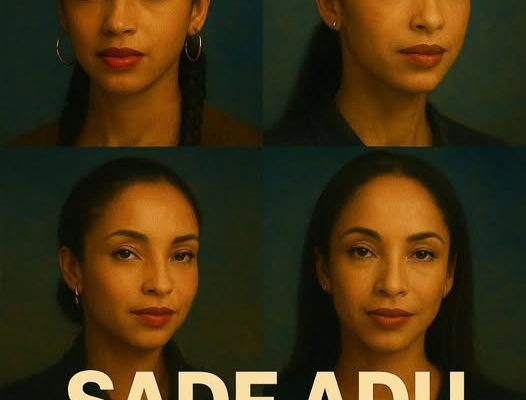Netflix has officially broken its silence and unveiled the trailer for the long‑awaited documentary about Sade Adu, capturing widespread attention among fans, critics, and music lovers alike. Dubbed Sade Adu: The Voice Beyond Time — The Untold Story, the film promises to peel back the curtain on the private life and creative process of a woman whose artistry has always existed partly in mystery.) While the complete film has not been public for long, reactions to the trailer and early press coverage already suggest that this documentary aims to be more than a standard career retrospective—it attempts to locate the person behind the legend, tracing how her roots, relationships, struggles, and discipline shaped a voice that has resonated across decades.
From the first frames of the trailer, audiences see precisely the tension that defined Sade’s career: the interplay between her luminous public persona and her determination to preserve privacy. We see glimpses of the stage, moody lighting, archival concert footage, and a voiceover asking, “Who is Sade Adu when the music stops?” The visual language of the trailer is evocative, minimal yet emotionally charged, offering short bursts of images—studio sessions, candid expressions, backlit silhouettes—that suggest the greater narrative to follow. The trailer teases rare interviews, behind‑the-scenes footage, and archival material that has seldom (if ever) been released to the public.Already, even with just a few minutes of preview, viewers are drawn into the promise that the film will answer questions many have asked for decades: What drove Sade forward? What held her back? How did she balance artistry, identity, and personal life?
Born Helen Folasade Adu in Ibadan, Nigeria, and raised in England, Sade grew up navigating a dual heritage—a fact that informed both her worldview and her art. (Polysoccer) That tension of identity is likely to loom large in the documentary. Reports suggest the film will explore how her Nigerian roots and British environment shaped how she saw herself, how she performed, and how she remained determined to retain creative control.) Alongside her upbringing, the film intends to trace key moments in her early musical life: when she first felt the spark of songwriting, early performances, the decision to form a band, and the delicate process of stepping into a public role marked by both reverence and scrutiny.
Of course, the story of Sade’s band—Sade, which she fronted—is intimately entwined with her individual narrative. The documentary reportedly charts how the ensemble came together in the early 1980s, how they shaped their sound, and how, over time, they refined what became a distinctive blend of soul, jazz, and understated pop. (ISport) Viewers will be shown rare studio session footage that reveals how meticulous she was in pursuit of sound perfection, how she insisted on nuance, subtlety, and emotional honesty in her recordings. (ISport) Through interviews with bandmates, producers, and other collaborators, the film aims to show how the dynamics of collaboration shaped her musical output, but also how her own vision and exacting standards influenced the course of each project.
But the documentary reportedly refuses to idealize or gloss over difficulties. It is said to examine the challenges she confronted—the pressures of fame, expectations to deliver, and the male‑dominated music industry in which she had to claim space without sacrificing dignity. (ISport) The long gaps between her album releases are poised to emerge not as faults but as intentional, fiercely guarded intervals during which she recharged, recalibrated, or protected herself. The film appears ready to explore how she resisted trends, refused to compromise, and how these choices cost her in some respects, even if they secured her artistic authenticity.
One of the most intriguing promises of the trailer is glimpses into her private sphere—her relationships, emotional struggles, and personal philosophies that have rarely surfaced in public discourse. While she has maintained strong boundaries around her private life, the documentary reportedly includes perspectives from family, close friends, and confidants who can shed light on how she viewed love, motherhood, grief, and selfhood. (ISport) These personal dimensions promise to humanize the figure many have looked up to from afar, offering nuance, fragility, and courage in equal measure.
The timing of this documentary release seems particularly fitting. In an era obsessed with exposure, oversharing, and constant visibility, Sade’s career has always stood in contrast—a testament to restraint, mystery, and creative sovereignty. The Netflix film thus stands to do more than recount her legacy; it might interrogate what it means to endure, to remain elusive, and to allow silence to speak as loudly as sound. The documentary appears poised to explore how Sade turned self‑imposed pauses, spaces of absence, into elements of her mystique and enduring potency.
Early reactions to the trailer have been enthusiastic. On social media, fans have described the preview as a “gift long overdue” and celebrated the possibility of hearing Sade’s own reflections, not just secondhand commentary. (ISport) Music journalists and cultural commentators are beginning to draw parallels to other iconic music documentaries, speculating that this film could become a landmark in how we understand not just Sade, but what it means for an artist to age, evolve, and endure. Some suggest that the film will prompt a reappraisal of her canon, encouraging listeners to revisit her discography with new ears. (ISport) Already, playlists of her greatest hits are being reshared, and new generations of music fans are discovering her catalog for the first time.
Visually and sonically, the documentary appears to be crafted with the same elegance and intentionality that defined her music. The trailer promises high production values: restored concert footage, carefully curated archives, carefully framed interviews, and imagery that reflects the moods Sade’s songs evoke—lush, introspective, timeless. Such attention to aesthetic coherence hints at a film that not only narrates a life, but embodies it in tone and form.
One of the central questions the documentary seems primed to explore is legacy: how does an artist whose output is measured, whose presence is selective, remain relevant across generations? The film will likely trace how her influence rippled across genres, how she inspired R&B and soul artists, how her understated style shaped how people thought about poise and sensuality, and how her work has been referenced, sampled, and revered. (ISport) Through conversations with contemporary musicians, cultural critics, and fans, the film may show the unexpected ways her imprint persists in today’s musical landscape.
Despite the anticipation, many details remain under wraps. The full release date has not been universally confirmed (though some sources speculate a late 2025 premiere) and Netflix has held back from revealing everything in the trailer, perhaps intentionally preserving some mystery. Whether the documentary will cover all facets—her family relationships, personal struggles, or more controversial or painful moments—remains to be seen. But the early signals suggest a film that will lean toward a respectful, emotionally resonant portrait rather than an exposé.
For longtime fans, this documentary represents a rare invitation into parts of Sade’s world they’ve only glimpsed across album liners, interviews, and songs. For newer listeners, it offers context and connection, a chance to hear not just her voice but her story. It bridges time: reminding those who lived through her early career of her enduring magic, while giving younger audiences a way to understand why Sade’s voice still feels necessary.
In sum, Sade Adu: The Voice Beyond Time — The Untold Story promises to be a richly textured, emotionally grounded, and visually evocative exploration of an artist who has defined her own terms. It aims to trace the arc of her journey—from Nigeria to England, from obscurity to global acclaim, and from public performer to a figure cloaked in curiosity—while honoring the choices she made to protect herself, to create on her own timeline, and to let her music speak louder than any spectacle ever could. When the film finally lands, it is likely to feel, for many, like the moment they’ve been waiting for: an opening into the life behind one of the most haunting, graceful, and resilient voices in modern music.



